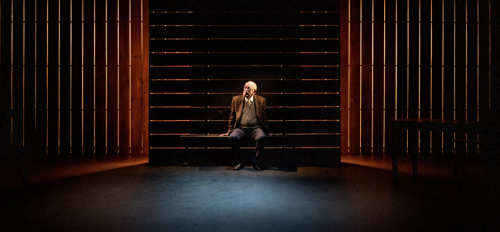
There are some stories so brutal and emotionally draining that you fear hearing them.
The thing about such painful memories is that when expressed as art they can become tales that are so eloquent you are not only thrilled that you experienced it, but you want everyone to share in the experience.
That is how I felt leaving the world premiere performance of “The Happiest Man on Earth” playing at Barrington Stage Company in Pittsfield, MA. I hope the play has a long life after it closes here on June 17.
And, if it does, I hope it stars Kenneth Tigar who gives one of those performances in which actor and character merge to the point where you cannot tell one from another. Rarely have I seen an actor so inhabit a character than Tigar does with Eddie Jaku.
“The Happiest Man on Earth” is adapted from the memoir of the same name telling the story of Jaku’s experience in Nazi concentration camps.
Though those experiences take up the bulk of the play, the take away is how Jaku could let go of his hatred of so many people who thrived on committing horrid inhumane acts, as well as exterminating 6-million Jews.
By the way, the biography was published when Jaku was 100 years old.
Because Tigar, directed by Ron Lagomarsino, tells of Jaku’s beatings in such an articulate manner, the loss of his parents, his many attempts to escape and the soul crushing betrayals and other in unimaginable experiences become real when he speaks.
Certainly you are affected by the horrors he experienced. But even as you are often in despair wondering how human beings can be so cruel to each other, you also are in awe at the tenacity and will-to-live exhibited by Jaku, and others like him.
You are also in awe of the devotion and love of family and friends that Jaku experienced. His courage and generosity of spirit makes his story inspirational on many levels.
However, if there is a disappointment in the work, it is that we learn little of Jaku’s post-war life. He tells us he became the happiest man on earth, and we believe it. Yet, it seems to come like a bolt from the blue when his first son was born.
What is missing is how the man used the rest of his life as a philosopher of peace, love and happiness.
The play by Mark St. Germain is simply brilliant. He is a familiar voice at Barrington Stage having had 14 of his plays staged there. This, to me, is his finest play. He condensed years into a speedy 90-minutes, which likely explains the omission of Jacu’s later day accomplishments.
Again, condensing might explain moments which seem confusing and lacking in detail. One minute he’s naked and ill, the next he has money for bathing. However, what is important is the playwright never loses the essence of Jaku’s torturous life or his indomitable spirit.
St. Germain not only makes vivid the attempted extermination of a culture, he emphasizes the reason such atrocities could happen.
While condemning the specific actions of the Nazis, St. Germain makes it clear that the regime was successful because it bred fear and distrust among friends and neighbors while giving the populace a common enemy to hate.
It should go without saying the Holocaust must never be forgotten. St. Germain and Tigar make it clear the economic and social problems that permitted the Holocaust to happen seem dangerously contemporary.
In the play, a world-wide distrust of other nationalities is shown when Belgians refuse to help the escapee because he is German and possibly a spy.
Jaku realizes he is rejected in Belgium because he is German. But in his native country the Germans deny his origins and define him as a Jew. This taught him that any reason for cultural hatred is artificial.
For the rest of his life Jaku lived by his father’s guide to life. “Family first. Family second, and last. And everyone is family.”
“The Happiest Man on Earth” plays at Barrington Stage in Pittsfield, MA through June 17. For tickets and schedule go to barringtonstageco.org
Read the full article by Bob Goepfert here.